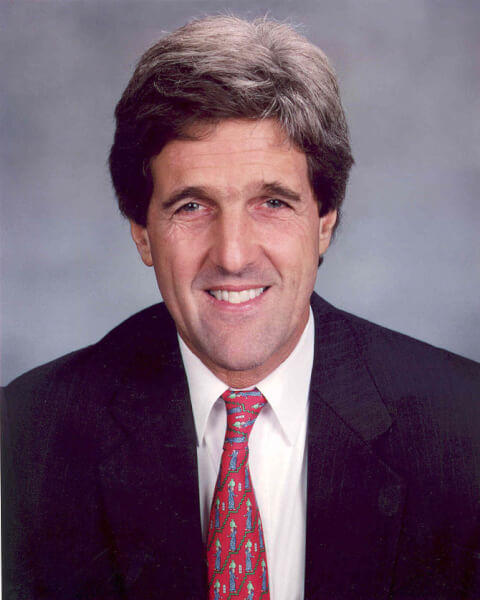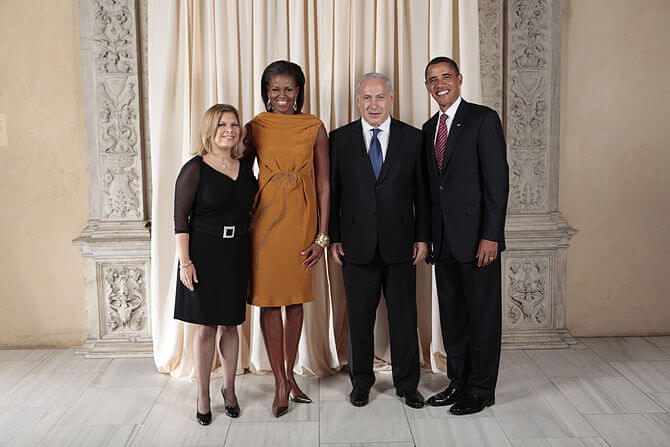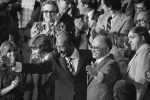Kerry warns Israel-Palestine relations “getting worse”
In speaking to the pro-Israel Saban Forum organized by the Brookings Institution’s Center for Middle East Policy this past week (Dec. 2, 2016), outgoing Secretary of State John F. Kerry said that the situation for peace “is “getting worse.” And, he cautioned, no peace with the Arab World can be achieved without reaching peace with the Palestinians. The question is, is anyone in Israel listening?
By Ray Hanania
In speaking to the pro-Israel Saban Forum organized by the Brookings Institution’s Center for Middle East Policy this past week (Dec. 2, 2016), outgoing Secretary of State John F. Kerry said that the situation for peace “is “getting worse.” The question is, is anyone in Israel listening?
The Saban Forum, named in honor of the chief financial sponsor, pro-Israel philanthropist and billionaire businessman Haim Saban, annually examines issues facing the State of Israel and it’s relations with respect to the peace process.
The 13th annual forum was held December 2 to 4 and was titled “Challenges for the Trump Administration in the Middle East.” In addition to Secretary Kerry, speakers included Israel’s Prime Minister Benjamin Netanyahu (via satellite), Israel’s rightwing Defense Minister Avigdor Lieberman, Egypt’s Foreign Minister Sameh Shoukry, but no prominent Palestinian leaders reflecting the problems that peace in the Middle East has faced.
Despite his professed support for Two-States, his understanding of the mutual suffering of Israelis and Palestinians, President Barack Obama will turn over the President’s office in January to President-Elect Donald Trump having failed on almost every level to nudge the peace process closer to reality.
Kerry’s frank remarks reflect how difficult the peace process has been and how ominous it has become.
The forum is conducted in a Q & A interview format led by Saban and a guest, this time pro-Israel and American Jewish journalist Jeffrey Goldberg of The Atlantic Magazine.

Goldberg began the forum by asking this question,”In May of 2013 at the outset of the most recent process, you said that the two-state solution had about 18 to 24 months; if you couldn’t achieve the two-state solution in 18 to 24 months it would be too late. We’re now three and a half years out from that date. Is it too late for the two-state solution? Do you agree with your statement from 2013?”
Kerry reminded the audience of the history of Israel’s creation beginning with the founding of Zionism at Basel, Switzerland by Theodore Herzl, the Balfour Declaration, the UN Resolution 181, the June war, but said, “There is no status quo. It is getting worse. It is moving in the wrong direction.”
Kerry reminded the forum that during the three years of pushing for the establishment of the Two-State Solution, which calls for a secure Israel and a sovereign State of Palestine, he has had formal conversations with Netanyahu 375 times, an additional 130 hours of conversations, made 40 trips to Israel and the Palestinian territories, and that the Obama administration has stood strong next to Israel in its defense.
He also reminded them about how much the American people, taxpayers, have invested int his process, too.

“But here we are now in a situation, folks, where I speak as this unapologetic friend of Israel. I’ve watched while we, the Obama Administration, have put $23.5 billion on the line for foreign military financing,” Kerry said, according to a transcript of the forum from the Brookings Institution.
“More than 50 percent of the total that we give to the entire world has gone to Israel. We have just signed an agreement for $38 billion over 10 years, $3.8 billion a year, up from 3.1. And we have never, ever shied away from vetoing a resolution or standing up against an unfair and biased resolution at the UN, at the Human Rights Council, at UNESCO, you name it. And we – and many times, my friends, alone, the only nation in the world that stood by Israel. We were there.”
Kerry then asked the audience how many people don’t believe in the “Two-State Solution,” and only a few people, he noted, raised their hands. And he emphasized that the feeling among many Israelis that they no longer need to negotiate a peace with the Palestinians is a major mistake.
“… Let me tell you a few things that I’ve learned for sure in the last few years. There will be no separate peace between Israel and the Arab world,” Kerry warned. “I want to make that very clear to all of you. I’ve heard several prominent politicians in Israel sometimes saying, well, the Arab world is in a different place now, we just have to reach out to them and we can work some things with the Arab world and we’ll deal with the Palestinians. No, no, no, and no. I can tell you that reaffirmed even in the last week as I have talked to leaders of the Arab community. There will be no advance and separate peace with the Arab world without the Palestinian process and Palestinian peace. Everybody needs to understand that. That is a hard reality.”
Kerry said in no uncertain terms that Israel must chose between peace of continued settlement building, a choice that many rightwing Israelis have tried to deny exists, asserting that peace is not about land but about Palestinian acceptance of a “Jewish State.” In fact, Netanyahu made that assertion before the forum, Goldberg later acknowledged.
Palestinians have responded that the real issue is about Israelis and Jews accepting a “Palestinian State” and recognizing the rights of Palestinians to exist as a people.
“There’s a basic choice that has to be made by Israelis, by the leadership of Israel, by all of you who support Israel and care about Israel. And that is: Are there going to be continued settlements? Is there going to be a continued implementation of settlement policy, or is there going to be separation and the creation of two states?” Kerry said.
He added, “… I also cannot accept the notion that they don’t affect the peace process, that they aren’t a barrier to the capacity to have peace. And I’ll tell you why I know that: because the left in Israel is telling everybody they are a barrier to peace, and the right that supports it openly supports it because they don’t want peace. They believe it’s the greater Israel. They are pursuing a policy of greater Judea/Samaria building out into the West Bank because they believe it belongs to them. And they want it to block the peace because they want those places to belong to Israel. That’s the history of the settler movement, my friends.”
And Kerry cited the rhetoric of a notorious racist Israeli official, saying, “Naftali Bennett said a few days ago, weeks ago, this represents the end of the era of the two-state solution. And more than 50 percent of the ministers in the current government have publicly stated they are opposed to a Palestinian state and there will be no Palestinian state. So this is the predicament. This is where we find ourselves.”
Goldberg, an anti-peace activist who opposes Palestinian rights, argued in response that the peace process was “past the tipping point.” But Kerry pushed back saying that was not correct.
“No, we haven’t, but we’re getting very – we’re getting – I’ll tell you why we haven’t. Because this is a function of leadership. It’s a function of belief. It’s a function of what choices are being put to the people of Israel,” Kerry responded.
Kerry added, “I venture to tell you there is a strong, strong base within the security establishment of Israel who believe that you have to resolve this question with the Arab world and with the Palestinians, because if you don’t do that, you will – how do you end the – I mean, how do you allow the Arab street to ultimately come to grips with the future of the region? Moreover, I am convinced – I say this to everybody – that the conversations I’ve had in the Arab world do indicate to me that the Arab world is ready to move into a different kind of security posture. But to get there, Jeff, you’ve got to have a serious negotiation and you got to begin somewhere. Where is the United States in that? Our position has been 1967 lines plus swaps.”
Goldberg pushed hard asking why this was even of interested to Americans, hinting at where Israel’s rightwing government may be headed in the next few years lobbying that America should stay out of the conflict and allow Israel to confiscate the remaining West Bank lands while overseeing non-Jews through a continued military occupation.
And Kerry responded bluntly, “You cannot have peace – you cannot protect Israel, ultimately, folks, unless you can find a way to peace.”
Goldberg attempted to shift the focus to Syria, but Kerry insisted on staying focused on the failure of Israel to accept Palestine’s right to exist.
He said that the United States, in the remaining days of the Obama administration, would continue to stand in defense of Israel and rejecting any imposed solution through the United Nations sponsored by other European nations — as was done by the United Nations in 1947 ironically — but he added the process was becoming “more complicated.”
Click here to download the full transcript of Kerry’s remarks during the forum in PDF format.


- Israelisnipers shooting and killing hospital workers in Gaza - December 11, 2023
- CAIR Condemns Israeli Executions of Wounded, Unarmed Palestinian in West Bank - December 11, 2023
- Arab and Muslim American voters face a “simple choice” between Biden’s inhumanity and Trump’s edgy politics - December 9, 2023

























